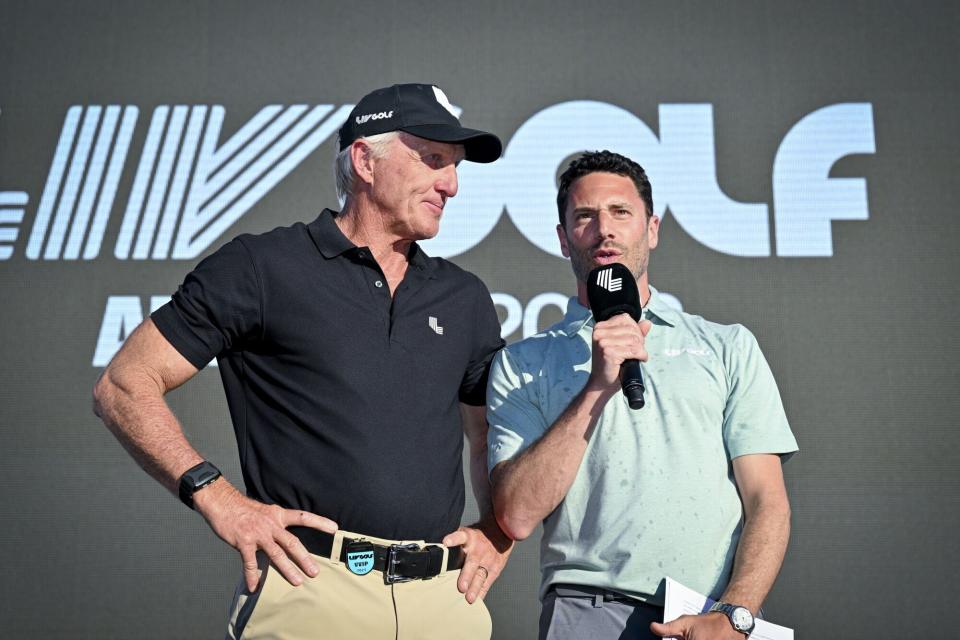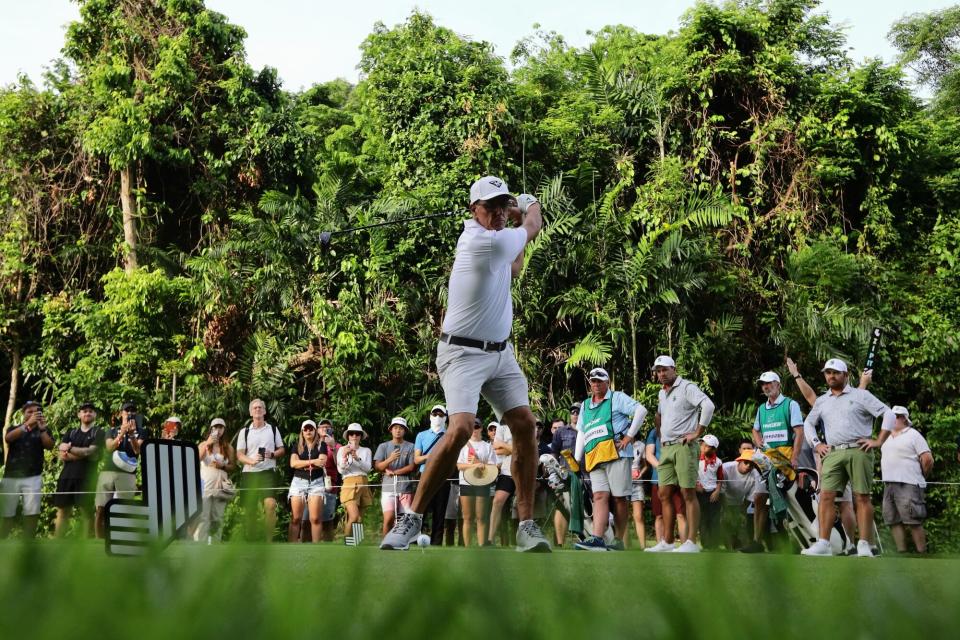Golf’s Thorniest Grudge Match Threatens the Game’s Old Order
- Oops!Something went wrong.Please try again later.
- Oops!Something went wrong.Please try again later.
(Bloomberg) -- Greg Norman tried and failed to beat the biggest name in professional golf nearly 30 years ago.
Most Read from Bloomberg
NYC Skyscrapers Sit Vacant, Exposing Risk City Never Predicted
Ukraine Leader Zelenskiy to Visit Hiroshima in Bid to Rally Aid
The rematch is becoming a high-stakes battle over how powerful one of the sport’s elite institutions should be. This time, Norman has what some experts say is a compelling antitrust argument on his side.
The Australian golf legend laid plans in 1994 for a rival to the PGA Tour called the World Golf Tour. Norman bet he could convince other pros to take part despite strict PGA Tour rules that kept them aligned with the host of some of golf’s most prestigious events. He lined up a lucrative TV pact with Fox, which was also hoping to shake up a staid business with a new formula.
The idea unraveled fast. Players got cold feet. A parallel US probe of the PGA Tour’s rules led to nothing. And the tour became more entrenched as the rise of stars like Tiger Woods drew in new fans.
Norman’s next act, LIV Golf, is doing all it can to challenge the PGA Tour. Flush with backing from Saudi Arabia’s $620 billion sovereign-wealth fund, LIV, for which Norman serves as commissioner and chief executive, spent hundreds of millions to attract players like Phil Mickelson. It just staged its sixth tournament this year, in Tulsa, Oklahoma, as it looks to attract viewers.
Far from the fairway, LIV is challenging the PGA Tour in US court. LIV claims in a lawsuit first filed by Mickelson and other players that rules that penalize golfers for participating in outside tournaments — including banning them from PGA Tour events — are anticompetitive. The case is expected to go to trial in May 2024, though PGA Tour has sought to push that back by six months.
The PGA Tour says its structure is meant to protect its members. It countersued LIV for pushing players to breach contracts in exchange for massive payouts. (LIV players can still compete in the sport’s four major tournaments, which include the Masters, where Mickelson and fellow LIV player Brooks Koepka tied for second, and this week’s PGA Championship, where 18 LIV golfers are expected to play.)
“On the traditional legal elements, LIV has a very solid case that the PGA is taking a bunch of actions that prevent competition,” said Joshua Davis, a professor at the University of San Francisco’s law school. “I do think that LIV has a very credible position.”
Bill Kovacic, a former Federal Trade Commission chairman and professor of law and policy at George Washington University, says LIV has a genuine prospect of prevailing. “This case more than any other goes to the real heart” of the way the PGA Tour does business, Kovacic said.
Billions of dollars are at stake for organizers, TV networks, advertisers and athletes. LIV has argued that the PGA Tour’s power has frustrated its efforts to strike deals for broadcast rights and sponsorships. The PGA Tour has billions of dollars in broadcast deals and a long list of corporate sponsors, including FedEx, Citigroup, Amazon Web Services and Rolex. LIV has said in court filings that it has struggled to reach lucrative marketing and broadcast deals.
Representatives of LIV Golf didn’t respond to multiple requests for comment for this article. A PGA Tour spokesman declined to comment on “open legal matters.”
Nine individual golfers who were involved in the case early on have withdrawn, saying they are prepared to let LIV fight on their behalf, and two remaining players, Matt Jones and Bryson DeChambeau, who are named as plaintiffs are bowing out, LIV has indicated.
“Because the Tour’s delay tactics have unduly prolonged this case, the players have chosen to focus their time and attention on their playing careers and let LIV bear the public burden of pursuing these claims," LIV said in a filing on Monday in which it disclosed that all players had decided to walk away.
Representatives for Jones and DeChambeau didn't respond to requests for comment.
Close Scrutiny
LIV has been shadowed by allegations from the PGA Tour and human-rights advocates that Saudi Arabia is trying to improve its international reputation by backing popular global sports. Saudi money has poured into soccer, for example, with the Saudi Public Investment Fund, or PIF, leading a takeover of the English Premier League’s Newcastle Football Club. Portugal’s Cristiano Ronaldo agreed to play in the Kingdom for about $200 million a year.
By choosing to fight in US courts, LIV and PIF have opened themselves to close scrutiny, something Saudi officials have sought to avoid in other cases. As part of the pretrial process, the PGA Tour won an order forcing PIF to submit confidential documents and its governor, Yasir Al-Rumayyan, to be deposed by PGA Tour attorneys. The Saudi fund and its chief have challenged that order in a federal appeals court in California and have won a ruling that they can stand down from any questioning until that is resolved.
“Once you set a complaint in motion, once you set the legal process in motion, it travels in completely unintended directions and you lose control of it,” said Kovacic, the former FTC chairman. “The US process of discovery, of gathering evidence, is singularly powerful.”
Part of LIV’s initial pitch to players was that it could beat the PGA Tour in court. The circuit promised eye-popping prize money, signing bonuses and guaranteed pay, and PIF’s attorneys assured golfers who voiced concern about being banned by the PGA Tour that antitrust law was on their side, according to people familiar with the proposals who spoke on condition of anonymity because the details are private.
As early as 2021, PIF pitched golfers and their agents through roadshows and Zoom presentations that were subject to nondisclosure agreements, according to a sports agent who asked to remain anonymous to discuss private information. The agent said he refused to pursue LIV’s overtures because he thought it was risky and wasn’t convinced that a legal challenge would end in the upstart’s favor.
The PGA Tour scored an early victory when US District Judge Beth Freeman ruled that it could ban three golfers who joined LIV from last year’s FedEx Cup Playoffs, cutting them off from its $18 million top prize. The PGA Tour argued — and the judge agreed — that the players hadn’t shown they faced “irreparable harm,” given the amount of money they’d received from LIV.
That decision reflects an important hurdle for the antitrust case: LIV must prove that it was injured by the PGA Tour’s conduct, according to Henry Hauser, an attorney at Perkins Coie who focuses on antitrust investigations. The PGA Tour might bring in evidence to say, “LIV is doing just fine. They’re attracting plenty of golfers and generating interest,” Hauser said.
“If there is actual evidence out there that PGA Tour, behind the scenes, has been erecting barriers to entry by coercing other entities in the golf ecosystem, such as media partners, official golf world rankings, other lower ranking tours, and golf courses — that’s an antitrust violation,” said Jodi Balsam, a professor at Brooklyn Law School and former attorney for the National Football League. “But so far there is no record of that evidence that we’re aware of — just allegations in a complaint.”
The battle is likely to resound outside the world of golf, affecting decisions by athletes in individual sports like figure skating and swimming about whether to participate in startup organizations with well-lined purses and large prizes, according to London-based sports attorney and arbitrator Jeffrey Benz. Arbitrators in London earlier ruled that DP World Tour, previously known as the European Tour, may punish golfers who joined LIV Golf.
Getting Louder
LIV’s style of “golf, but louder” debuted last June in London, where players and caddies were ferried to their tees in black cabs. Its events are shorter than a typical four-round PGA tournament — LIV, in Roman numerals, is 54, or the number of holes played in three rounds — with its 48 players divided among 12 teams. LIV wants to build franchises around the teams, similar to Formula 1 racing. To help build buzz, LIV has hosted splashy events, like lining up DJ duo The Chainsmokers to perform at its April tournament in Singapore.
However, LIV claims the PGA Tour has undermined it with aggressive tactics.
LIV alleges in court filings that the PGA Tour threatened sponsors, vendors, broadcasters and agents to coerce players to steer clear of the upstart. That imperiled an “otherwise-promising launch” and “undermined the most meaningful competitive threat the Tour has ever faced,” LIV said in its lawsuit. The PGA Tour colluded with other golf circuits, including the European Tour, to sideline and shun players who signed LIV contracts, LIV claims. The PGA Tour has denied such allegations in court filings.
Bill Baer, a former assistant attorney general in charge of the Justice Department’s antitrust division and former FTC official, said it’s legitimate and lawful for the PGA Tour to set down rules for its members. “If it orchestrates a boycott, encourages other organizations to refuse to deal with people who join the LIV tour, that is potentially more problematic,” Baer said.
LIV claimed in a court filing that a PGA Tour official sabotaged its negotiations with sports broadcasters, pushing it to partner with a “secondary network, with LIV being its first sporting event,” a reference to its pact with CW Network. The PGA Tour’s anticompetitive conduct has “damaged LIV’s brand, driven up its costs by hundreds of millions of dollars and driven down revenues to virtually zero,” LIV alleged in a separate filing.
The PGA Tour declined to comment on this claim.
The dispute has drawn the attention of the US government, with both sides coming under scrutiny. The Justice Department’s antitrust division has sent inquiries to sports agents concerning the PGA Tour’s bylaws on participating in other golf events. The previous inquiry by the FTC into PGA Tour rules in the mid-90’s, as Norman was trying to get his earlier league off the ground, ended without the agency taking action.
“We went through this in 1994 and we are confident in a similar outcome,” a PGA Tour spokesperson said last year. The Justice Department declined to comment on its investigation.
Meanwhile, some US politicians have tried and failed to put curbs on LIV. New Jersey lawmakers proposed banning LIV from clubs in the state by prohibiting contests by sports organizations “operated primarily through use of monies received from sovereign wealth funds.” A group of Democrats introduced the bill after former President Donald Trump hosted a LIV event at his club in Bedminster in July.
“I wrote this specifically for Saudi Arabia,” New Jersey State Senator Andrew Zwicker said in an interview. “There’s really no other country doing anything like this anywhere else in the world.” Zwicker’s office later said that the bill was dead after the state’s Office of Legislative Services raised concerns about its constitutionality.
Some lawmakers in Washington have also recoiled from LIV. Representative Tim Burchett, a Tennessee Republican, said he walked out of a GOP meeting in Washington in September where Norman appeared.
“I get what they’re doing, but I don’t buy it at all,” Burchett said in an interview. He said he was turned off by the circuit’s Saudi backing, citing the Kingdom’s human-rights record and the involvement of Saudi nationals in the Sept. 11, 2001, terror attacks in the US.
Shunning Defectors
While the court fight unfolds, the PGA Tour has increased the size of its prizes and adopted other more player-friendly policies, according to Golf Channel contributor Eamon Lynch. Rory McIlroy, one of the most vocal defenders of the PGA Tour, said that LIV’s arrival “has caused a ton of innovation.”
“LIV coming along has had a massive impact on the game but I think everyone who’s a professional golfer is going to benefit,” he said.
Still, some bruises are visible. In March, at the Players Championship at TPC Sawgrass in Ponte Vedra Beach, Florida, the Australian flag was hoisted in honor of the previous champion, Brisbane-born Cameron Smith, who had signed up with LIV months earlier. At the 2022 prize ceremony, PGA Tour Commissioner Jay Monahan said the gates of Sawgrass would always be open for Smith, who lives a few miles away.
This year, Monahan said Smith made his choice to leave and defectors won’t be allowed back, indicating even reigning champions can’t return.
That hasn’t stopped fans and some players from hoping for a rapprochement. Laurie and Sam Acciavatti, who were at the Players to watch a practice round, said they miss Mickelson and Smith. They are hopeful the groups will merge.
For now, though, LIV and PGA players will continue to move mostly in separate universes. Tiger Woods said at a tournament in November he doesn’t see a way for the organizations to co-exist.
“Not right now, not with their leadership, not with Greg there and his animosity towards the Tour itself,” Woods said. “I don’t see that happening.”
Most Read from Bloomberg Businessweek
Japan’s New Military Might Is Rising in a Factory in Hiroshima
ESG Investing Goes Quiet After Blistering Republican Attacks
Sweetgreen Tests Robots to Make Faster, More Efficient Sad Desk Salads
©2023 Bloomberg L.P.





